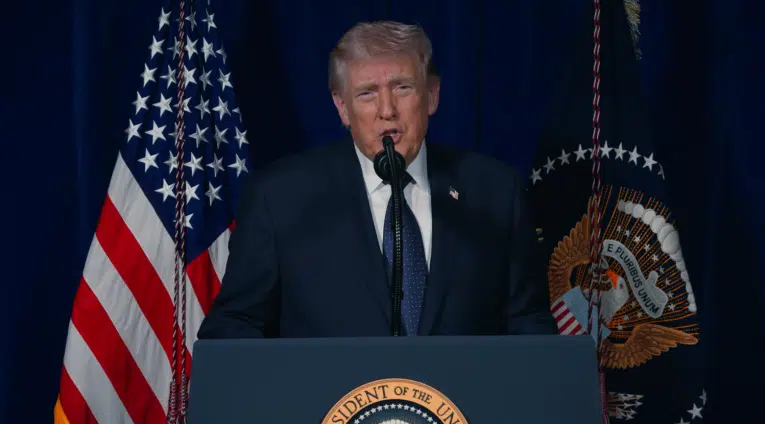
The U.S. Supreme Court upheld by a 7-2 majority expedited removals of illegal aliens without a hearing under the Illegal Immigration Reform and Immigrant Responsibility Act of 1996 in the case Department of Homeland Security v. Thuraissigiam in 2020.
Writing for the majority, Justice Samuel Alito noted that the entire intent of the legislation was to expedite removals: “In 1996, when Congress enacted the Illegal Immigration Reform and Immigrant Responsibility Act (IIRIRA), 110 Stat. 3009–546, it crafted a system for weeding out patently meritless claims and expeditiously removing the aliens making such claims from the country. It was Congress’s judgment that detaining all asylum seekers until the full-blown removal process is completed would place an unacceptable burden on our immigration system and that releasing them would present an undue risk that they would fail to appear for removal proceedings.”
Alito added, “Every year, hundreds of thousands of aliens are apprehended at or near the border attempting to enter this country illegally. Many ask for asylum, claiming that they would be persecuted if returned to their home countries. Some of these claims are valid, and by granting asylum, the United States lives up to its ideals and its treaty obligations. Most asylum claims, however, ultimately fail, and some are fraudulent.”
Every year, there are over 20,000 such expedited removals according to U.S. Customs and Border Protection data compiled by the Transactional Records Access Clearinghouse of such inadmissibles without any hearing as Congress provided: 23,957 in 2014, 25,967 in 2015, 30,346 in 2016, 32,941 in 2017, 30,988 in 2018, 30,852 in 2019, 21,578 in 2020, 23,262 in 2021, 21,978 in 2022, 21,519 in 2023 and 21,998 in 2024.
And on due process? The Court ruled it did not apply to aliens without long-standing connections in the U.S., Alito wrote, stating, “While aliens who have established connections in this country have due process rights in deportation proceedings, the Court long ago held that Congress is entitled to set the conditions for an alien’s lawful entry into this country and that, as a result, an alien at the threshold of initial entry cannot claim any greater rights under the Due Process Clause.”
At the time, nobody could have fully anticipated — except perhaps for President Donald Trump — that when former President Joe Biden took office he would open the flood gates for illegal aliens, with a record 10.8 million border encounters of illegal aliens from 2021 to 2024 according to data compiled by the Office of Immigration Statistics, most of whom were released into the U.S. without any legal status.
If ever there was a case for expedited removals as Congress intended, it is now. Speaking to reporters on April 14, White House Deputy Chief of Staff Stephen Miller outlined the dilemma facing the American people, that there simply is not enough time to conduct the number of removal hearings that would be needed if everyone who Biden and other administrations let in gets a hearing: “There’s 15 million illegal aliens that violated the country. If every one of them got the trial that you’re asking for, it would take us centuries to remove them, centuries. We’re talking about this in 300, 400 years. Their great, great, great grandchildren would be the ones representing them in court, that’s how long it would take. Illegal aliens who come to our country have to be removed and they have to be removed quickly, and that is an essential component of having something that we like to call a country.”
But, fortunately, in 1996 Congress acted, and as Miller noted the Attorney General can act: “the Attorney General has authority to overrule the immigration court, and that’s actually by statute.” Here, Miller appears to be referring to 8 CFR Sec. 103.10(b): “Except as Board decisions may be modified or overruled by the Board or the Attorney General, decisions of the Board, and decisions of the Attorney General, shall be binding on all officers and employees of the Department of Homeland Security or immigration judges in the administration of the immigration laws of the United States.”
The regulation was established in part under 8 U.S. Code Sec. 1103(a) that “determination and ruling by the Attorney General with respect to all questions of law shall be controlling…” as it relates to “the administration and enforcement of this chapter and all other laws relating to the immigration and naturalization of aliens…”
But the laws that Congress enacted go much further than that.
Under 8 U.S. Code Sec. 1182(a)(3) aliens inadmissible on “Security and related grounds” are barred from entering the country without any hearing including “Any alien who a consular officer or the Attorney General knows, or has reasonable ground to believe, seeks to enter the United States to engage solely, principally, or incidentally in … any activity … to violate any law of the United States relating to espionage or sabotage or … to violate or evade any law prohibiting the export from the United States of goods, technology, or sensitive information … any other unlawful activity, or … any activity a purpose of which is the opposition to, or the control or overthrow of, the Government of the United States by force, violence, or other unlawful means, is inadmissible.”
Or any aliens the Attorney General finds to be terrorists: “Any alien who … has engaged in a terrorist activity; … a consular officer, the Attorney General, or the Secretary of Homeland Security knows, or has reasonable ground to believe, is engaged in or is likely to engage after entry in any terrorist activity… [or] has, under circumstances indicating an intention to cause death or serious bodily harm, incited terrorist activity; … is a representative … of … a terrorist organization … or … a political, social, or other group that endorses or espouses terrorist activity; … endorses or espouses terrorist activity or persuades others to endorse or espouse terrorist activity or support a terrorist organization; … has received military-type training … from or on behalf of any organization that, at the time the training was received, was a terrorist organization … [or] is the spouse or child of an alien who is inadmissible under this subparagraph, if the activity causing the alien to be found inadmissible occurred within the last 5 years, is inadmissible.”
On Jan. 20, his very first day in office for his second term, President Trump declared Tren de Aragua, MS-13 and other criminal gangs and drug cartels as terrorist organizations on Jan. 20 by executive order in accordance with 8 U.S. Code Sec. 1189, “Designation of foreign terrorist organizations.” Meaning, when so designated, they are inadmissible upon arriving in the country.
And under the 1996 immigration reform legislation, under 8 U.S. Code Sec. 1225(c) it authorizes that inadmissible aliens, especially those so designated as terrorists, can be immediately removed without a hearing: “If an immigration officer or an immigration judge suspects that an arriving alien may be inadmissible under subparagraph (A) (other than clause (ii)), (B), or (C) of section 1182(a)(3) of this title, the officer or judge shall—(A)order the alien removed, subject to review under paragraph (2); (B)report the order of removal to the Attorney General; and (C)not conduct any further inquiry or hearing until ordered by the Attorney General.”
And 8 U.S. Code Sec. 1225(c) provides the Attorney General can remove the alien without a hearing: “The Attorney General shall review orders issued … If the Attorney General… is satisfied on the basis of confidential information that the alien is inadmissible under subparagraph (A) (other than clause (ii)), (B), or (C) of section 1182(a)(3) of this title, and … after consulting with appropriate security agencies of the United States Government, concludes that disclosure of the information would be prejudicial to the public interest, safety, or security, the Attorney General may order the alien removed without further inquiry or hearing by an immigration judge.”
In short, when the Attorney General determines an alien is inadmissible under security related grounds, they can be removed without hearing under the law Congress enacted that the Supreme Court upheld. While Congress did not stipulate how long the terrorist needed to have snuck around the U.S. in order to be subjected to an expedited removal, the provisions of the law speak of “arriving” aliens, as it was in Thuraissigiam in 2020.
That said, If the Attorney General has intelligence that the alien is a terrorist, and again, that “after consulting with appropriate security agencies of the United States Government, concludes that disclosure of the information would be prejudicial to the public interest, safety, or security” then the alien can be removed “without further inquiry or hearing” as Congress’ intent was that the government be able to perform the removal confidentially.
Similarly, under the Patriot Act under 8 U.S. Code Sec. 1226a, aliens who have long since arrived and are declared to be terrorists can either be detained on six month rolling bases or removed via proceedings: “The Attorney General shall place an alien detained under paragraph (1) in removal proceedings, or shall charge the alien with a criminal offense, not later than 7 days after the commencement of such detention.”
In short, Congress created a bona fide political question as it related to terrorist aliens, giving broad authority for the Attorney General to designate them so. But in the case the Patriot Act, Congress’ intention was that such an alien deemed a terrorist would be taken out of the country via “removal proceedings”. So, then we’re back to hearings.
This might explain why President Donald Trump resorted to using the 1798 Alien Enemy Act in his March 15 proclamation, under which 50 U.S. Code Sec. 21 provides for removals of invaders so declared who are not “naturalized” to be removed: “Whenever there is a declared war between the United States and any foreign nation or government, or any invasion or predatory incursion is perpetrated, attempted, or threatened against the territory of the United States by any foreign nation or government, and the President makes public proclamation of the event, all natives, citizens, denizens, or subjects of the hostile nation or government, being of the age of fourteen years and upward, who shall be within the United States and not actually naturalized, shall be liable to be apprehended, restrained, secured, and removed as alien enemies. “
And while 50 U.S. Code Sec. 23 provides for judicial review, that only applies to “alien enemy residents”: “the several courts of the United States, having criminal jurisdiction, and the several justices and judges of the courts of the United States, are authorized and it shall be their duty, upon complaint against any alien enemy resident and at large within such jurisdiction or district, to the danger of the public peace or safety, and contrary to the tenor or intent of such proclamation, or other regulations which the President may have established, to cause such alien to be duly apprehended and conveyed before such court, judge, or justice…”
So, for example, if a citizen of Venezuela — the country named in Trump’s invocation of the Alien Enemy Act — is in the U.S. legally with a green card, they can be subjected to removal proceedings because they are “residents” under 50 U.S. Code Sec. 23. But if they are a part of the invading force and “not actually naturalized”, 50 U.S. Code Sec. 21 appears to apply.
Hypothetically, if an invading force occupied sections of U.S. territory, they would not become “residents” subjected to judicial proceedings, instead, they might be attacked by the U.S. Army, depriving them of their lives without “due process”. Clearly, President Trump would prefer to deal with the problem on military terms, as evidenced by his national emergency declaration, deploying the U.S. military to the border and declaring at least Tren de Aragua to be enemy aliens. He has also declared Tren de Aragua, MS-13 and other criminal drug cartel gangs to be terrorist organizations.
Some questions emerge: Did Congress intend to replace the Alien Enemy Act when it adopted the 1996 Illegal Immigration Reform and Immigrant Responsibility Act or the 2001 Patriot Act? Neither law made provision for a proclamation by the President that there is an invasion or predatory incursion to be interdicted, so maybe not. If not, then, is the Alien Enemy Act a suitable mechanism for the President to utilize for mass deportations?
In the meantime, as federal courts consider these questions actively, more consideration might be given by Congress itself to settle some of these questions. For example, in the upcoming budget, as it provides for border security and immigration reforms, it may wish to expand the basis for expedited removals. As Alito noted in 2020, “Congress is entitled to set the conditions for an alien’s lawful entry into this country…” With millions of illegal aliens and an overwhelmed system, Congress might need to act to settle these questions — or the courts might settle it themselves.
But even then, the Supreme Court might ultimately overturn further acts of Congress and simply confer “residency” on all illegal immigrants who have managed to evade authorities long “enough” as a constitutional matter and confer “due process”. If so, the illegal aliens might be here to stay permanently, which might have been the intention of Biden and other derelict presidents who refused to enforce the law all along.
Robert Romano is the Executive Director of Americans for Limited Government Foundation.






